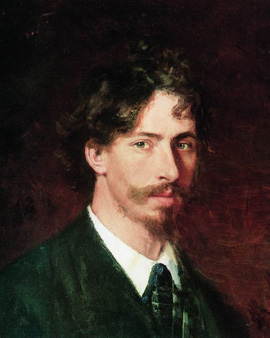The Russian Ilya Efimovich Repin was trained as an icon painter and during his life developed into the most important representative of Russian realism. Repin maintained contacts abroad in France while still a student and painted several portraits of the Russian pacifist and writer Leo Tolstoy.
His most famous work, "The Volgatreidler", was written between 1872 and 1873.
Ilya Repin had traveled to the Volga several times to draw the treidlers whose job it was to pull cargo ships up the Volga. All the people depicted were known to him by name. He had met each of them and studied them for a long time.
Repin showed "The Volga Midgets" at the Vienna World's Fair of 1873, where it was awarded a bronze medal and established his lasting artistic fame. Repin was able to sell the painting to the Grand Prince Vladimir Alexandrovich for 3000 rubles, and from then on he was financially supported by the Petersburg Academy so that he could devote himself entirely to painting.
Fyodor Dostoevsky wrote appreciatively about the painting in his "Diary of a Writer": "One must love the defenseless people, one cannot pass by them without taking them to one's heart. When you look at the picture, you feel spontaneously obliged to do something for these people, to stand up for them."
Repin saw it as his duty to show social ills, criticize them, and work for change. Until his death, the convinced vegetarian was also committed to the abolition of the death penalty.
×





.jpg)
.jpg)
.jpg)
.jpg)
.jpg)
.jpg)
.jpg)
.jpg)
.jpg)
.jpg)
.jpg)
.jpg)
.jpg)
.jpg)
.jpg)
.jpg)
.jpg)
.jpg)
_dans_une_salle_doperation_(The_Surgeon_Pav_-_(MeisterDrucke-1314481).jpg)
_dans_une_salle_doperation_(The_Surgeon_Pav_-_(MeisterDrucke-1314481).jpg)
.jpg)
.jpg)
 and Alexandra F - (MeisterDrucke-272776).jpg)
 and Alexandra F - (MeisterDrucke-272776).jpg)
.jpg)
.jpg)
_draw_a_boat_from_the_water_in_-_(MeisterDrucke-946865).jpg)
_draw_a_boat_from_the_water_in_-_(MeisterDrucke-946865).jpg)
.jpg)
.jpg)
.jpg)
.jpg)
 in his Study 1891 - (MeisterDrucke-102860).jpg)
 in his Study 1891 - (MeisterDrucke-102860).jpg)
.jpg)
.jpg)
.jpg)
.jpg)
.jpg)
.jpg)
.jpg)
.jpg)
_etreint_son_fils_Ivan_Ivanovich_(1554-1581)_quil_-_(MeisterDrucke-1318092).jpg)
_etreint_son_fils_Ivan_Ivanovich_(1554-1581)_quil_-_(MeisterDrucke-1318092).jpg)
.jpg)
.jpg)
 in the Novodevitchy Convent 1879 - (MeisterDrucke-102426).jpg)
 in the Novodevitchy Convent 1879 - (MeisterDrucke-102426).jpg)
_tue_par_son_rival_Geor_-_(MeisterDrucke-1325630).jpg)
_tue_par_son_rival_Geor_-_(MeisterDrucke-1325630).jpg)
 1901 - (MeisterDrucke-72869).jpg)
 1901 - (MeisterDrucke-72869).jpg)
.jpg)
.jpg)
.jpg)
.jpg)
.jpg)
.jpg)
_Sur_les_cotes_representation_du_bon_larron_-_(MeisterDrucke-1427886).jpg)
_Sur_les_cotes_representation_du_bon_larron_-_(MeisterDrucke-1427886).jpg)
.jpg)
.jpg)
.jpg)
.jpg)
_Le_retour_inespere_de_lexile_politique_a_-_(MeisterDrucke-1323025).jpg)
_Le_retour_inespere_de_lexile_politique_a_-_(MeisterDrucke-1323025).jpg)
.jpg)
.jpg)
.jpg)
.jpg)
.jpg)
.jpg)
.jpg)
.jpg)
.jpg)
.jpg)
.jpg)
.jpg)
_Repina_fille_de_lartiste_Peinture_de_Ilya_Yefimovich_R_-_(MeisterDrucke-1325699).jpg)
_Repina_fille_de_lartiste_Peinture_de_Ilya_Yefimovich_R_-_(MeisterDrucke-1325699).jpg)
.jpg)
.jpg)
.jpg)
.jpg)
.jpg)
.jpg)
.jpg)
.jpg)
.jpg)
.jpg)
.jpg)
.jpg)
.jpg)
.jpg)
.jpg)
.jpg)
 1881 - (MeisterDrucke-85730).jpg)
 1881 - (MeisterDrucke-85730).jpg)
_(Jesus_Christ_repousse_le_diable_dan_-_(MeisterDrucke-1314345).jpg)
_(Jesus_Christ_repousse_le_diable_dan_-_(MeisterDrucke-1314345).jpg)
 1900 - (MeisterDrucke-78912).jpg)
 1900 - (MeisterDrucke-78912).jpg)
 1882 - (MeisterDrucke-53383).jpg)
 1882 - (MeisterDrucke-53383).jpg)
_(1844-1930)_h_-_(MeisterDrucke-1322841).jpg)
_(1844-1930)_h_-_(MeisterDrucke-1322841).jpg)
_Oil_on_-_(MeisterDrucke-1007427).jpg)
_Oil_on_-_(MeisterDrucke-1007427).jpg)
.jpg)
.jpg)
 and Bedrich Smetana (1824-84) from Slavonic Composers 1890s - (MeisterDrucke-75807).jpg)
 and Bedrich Smetana (1824-84) from Slavonic Composers 1890s - (MeisterDrucke-75807).jpg)
 1879 - (MeisterDrucke-109239).jpg)
 1879 - (MeisterDrucke-109239).jpg)
.jpg)
.jpg)
.jpg)
.jpg)
_Murashko_-_(MeisterDrucke-1653556).jpg)
_Murashko_-_(MeisterDrucke-1653556).jpg)
_(Tolstoi)_(1828-191_-_(MeisterDrucke-1314391).jpg)
_(Tolstoi)_(1828-191_-_(MeisterDrucke-1314391).jpg)
.jpg)
.jpg)
 from Slavonic Composers 1890s (detail) - (MeisterDrucke-81217).jpg)
 from Slavonic Composers 1890s (detail) - (MeisterDrucke-81217).jpg)
.jpg)
.jpg)
_(1858-_-_(MeisterDrucke-1320781).jpg)
_(1858-_-_(MeisterDrucke-1320781).jpg)
.jpg)
.jpg)
.jpg)
.jpg)
.jpg)
.jpg)
.jpg)
.jpg)
.jpg)
.jpg)
.jpg)
.jpg)
.jpg)
.jpg)
.jpg)
.jpg)
 1887 - (MeisterDrucke-190951).jpg)
 1887 - (MeisterDrucke-190951).jpg)
.jpg)
.jpg)
.jpg)
.jpg)
_-_(MeisterDrucke-1324654).jpg)
_-_(MeisterDrucke-1324654).jpg)
.jpg)
.jpg)
 1883 - (MeisterDrucke-41324).jpg)
 1883 - (MeisterDrucke-41324).jpg)
 Frederic Chopin (1810-49) and Stanislaw Moniuszko (1819-72) from Slavonic Composers 1890s (detail) - (MeisterDrucke-65989).jpg)
 Frederic Chopin (1810-49) and Stanislaw Moniuszko (1819-72) from Slavonic Composers 1890s (detail) - (MeisterDrucke-65989).jpg)
.jpg)
.jpg)
 1914 - (MeisterDrucke-42172).jpg)
 1914 - (MeisterDrucke-42172).jpg)
.jpg)
.jpg)
_-_(MeisterDrucke-1319234).jpg)
_-_(MeisterDrucke-1319234).jpg)
.jpg)
.jpg)
.jpg)
.jpg)
.jpg)
.jpg)
.jpg)
.jpg)
_-_(MeisterDrucke-1317039).jpg)
_-_(MeisterDrucke-1317039).jpg)
.jpg)
.jpg)
.jpg)
.jpg)
.jpg)
.jpg)
_et_son_epouse_Alexandra_Fedorovna_(ou_Alexandra_Feodorovn_-_(MeisterDrucke-1323471).jpg)
_et_son_epouse_Alexandra_Fedorovna_(ou_Alexandra_Feodorovn_-_(MeisterDrucke-1323471).jpg)
 1915 - (MeisterDrucke-65316).jpg)
 1915 - (MeisterDrucke-65316).jpg)
.jpg)
.jpg)
.jpg)
.jpg)
.jpg)
.jpg)
_-_(MeisterDrucke-1513518).jpg)
_-_(MeisterDrucke-1513518).jpg)
.jpg)
.jpg)
.jpg)
.jpg)






